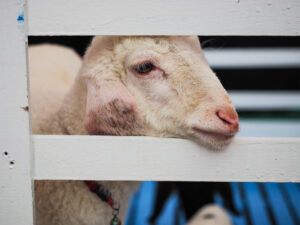Is there room for Jewish and Muslim traditions in Europe?
Is there room for Jewish and Muslim traditions in Europe?
The religious practice of slaughtering has been the subject of harsh debate in Europe in the past years. Will it be possible for Jews and Muslim to live in European countries that make it so difficult for them to eat according to their religious traditions?
Is halal and kosher slaughtering painful for animals?
The religious practice of slaughtering has been the subject of harsh debate in Europe in the past years and the debate was recently reopened by a new EU ruling against the practice of slaughtering. According to Muslim and Jewish law, animals need to be slaughtered, without being first stunned, with a razor-sharp knife in order to be permissible to eat. Meat that has been slaughtered according to the specific rules of Judaism is defined as kosher, and according to the rules of Islam is defined as halal.[1]
Animal welfare organisations argue that the practice causes excessive and unreasonable pain to the slaughtered animals, and urge the practice to be stopped.[2] Yet, not everybody agrees with this argument. For instance, scientist and activist Temple Grandin has argued that in reality, the religious practices of slaughtering actually cause relatively little pain to the animals.[3] Rather, she says, terrible and inhumane treatment of livestock is often performed irrespective of kosher or halal rules. She writes: “When the [slaughtering] cut is done correctly, the animal appears not to feel it.”[4]
European Court of Justice’s recent ban
Nonetheless, despite Grandin’s argument, many European countries still remain convinced that ritual slaughtering is a practice that needs to be stopped. In 2013, Slovenia banned ritual slaughtering without pre-stunning.[5] In Sweden since 2012 and Denmark since 2014, animals can only be slaughtered if they have been previously sedated.[6]
Yet, in this article, we will focus on the more recent European Court of Justice ruling (ECJ), approved in 2020. According to this new ruling, all members of an EU state are allowed[7] to require the stunning of the animal before slaughtering it. This, according to the ruling, will not contradict the rights of Muslims and Jews.[8]
The disappointed reactions to the ruling
The new EU ruling caused uproar in both Muslim and Jewish communities. Daniel Mariaschin, the CEO of B’nai B’rith International, has argued that this new decision will impact the religious freedom of Jews all over Europe. The President of the State of Israel, Benjamin Netanyahu, reacted to the ruling by sending a direct letter to the leaders of several European countries and to the presidents of the European Commission and the European Council. In the letter, Netanyahu underlined the terrible impact this decision could have on the life of Jews in Europe and argued that the “decision threatens the religious freedom of Jews throughout Europe.” Jews, in fact, will not be able to practice their traditions if slaughtering is banned in Europe.[9]
Voices of discontent have also been heard from the Muslim world. Mehmet Üstün, President of the Exécutif des Musulmans de Belgique (EMB), underlined the community’s discontent regarding the new ECJ ruling. He argued that a different solution to the problem of slaughtering and animal welfare should be found, and that the EU ruling does not solve the issue. Moreover, Abdassamad El Yazidi, from the German Central Council of Muslims, posted on Twitter that halal and kosher slaughter support animal wellbeing. In a TV interview, he also argued that Muslims will not be able to feel at home in Europe if access to halal food is difficult.[10]
Finally, there is a possibility that the new ruling will lead to a ‘domino effect’,[11] and that activists that are against Muslim and Jewish slaughtering practices will use the new ruling as an excuse to re-open the debate on slaughtering in their own countries. For instance, soon after the new ECJ ruling, a British woman started a petition in favour of the banning of ritual slaughtering in the UK.[12]
Is there a way to find compromise?
The new ECJ ruling may have harsh and far-reaching consequences for Jews and Muslims around Europe in the near future. The ruling gives legal legitimacy to all European countries to undertake restrictions and bans to ritual slaughtering, thereby freeing them from the worry of violating the rights of the freedom of religion.[13] Yet, the question remains how it will be possible for observant Jews and Muslims to live in countries that make it so difficult to eat according to their religious rules and traditions. Will they be able to find a compromise with their individual countries? Or will they – eventually – need to leave?
Our team of analysts conducts research on topics relating to religion and society. In the past month, the topics of traditions, tension, corona, and leadership were trending. Find out their relationships on the EARS Dashboard.
[1] Religious slaughter of animals in the EU
[2] Religious slaughter of animals in the EU
[3] Recommended Religious Slaughter Practices
[4] Recommended Religious Slaughter Practices
[5] Stunning in ritual slaughter in Slovenia
[6] Legal Restrictions on Religious Slaughter in Europe
[7] In order to promote animal welfare in the context of ritual slaughter, Member States may, without infringing the fundamental rig
[8] In order to promote animal welfare in the context of ritual slaughter, Member States may, without infringing the fundamental rig
[9] Netanyahu appeals to European leaders not to outlaw kosher slaughter
[10] EU highest court says states can prohibit non-stun ritual slaughter, including halal, causing strong reactions
[11] EU highest court says states can prohibit non-stun ritual slaughter, including halal, causing strong reactions
[12] EU highest court says states can prohibit non-stun ritual slaughter, including halal, causing strong reactions
[13] In order to promote animal welfare in the context of ritual slaughter, Member States may, without infringing the fundamental rig






